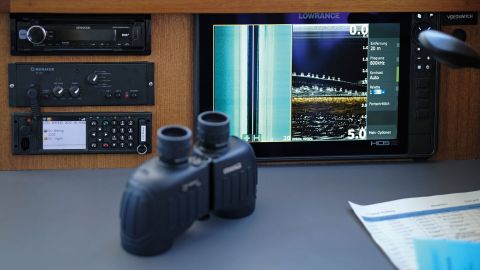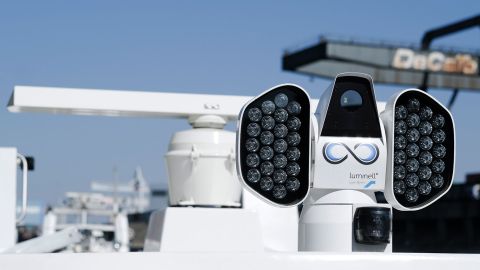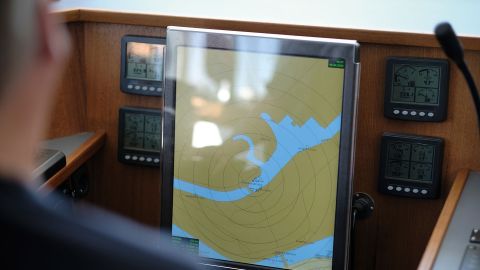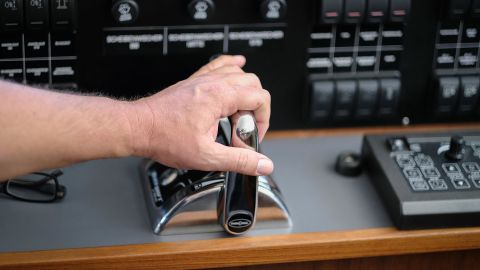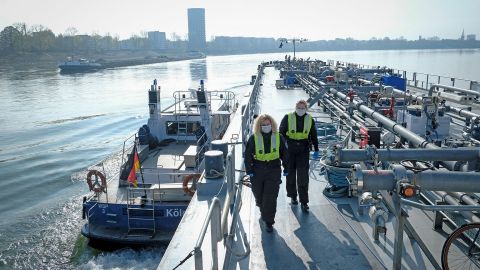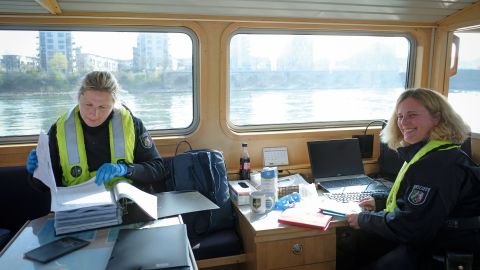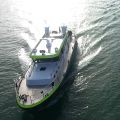Cologne, Rhine kilometer 687: The crew of the "WSP 3" is waiting on the Deutz side opposite the crane buildings. Police Chief Superintendent Udo Scheunemann (POK) is at the helm of the boat, which was built in 1996. The skipper is Chief Superintendent Sandra Huster-Stemke (PHKin). Also on board: Chief Superintendent Andrea Schaaf (PHKin), who is a member of the Hazardous Goods and Environment Investigation Group. The three officers have already "made ready" the boat below the station, put on their antistatic uniforms and donned their weapons. Before they set off, they have to check the oil level, diesel and the boat's operational capability. The engine and equipment are ready. The "WSP3" can cast off.
A few hours earlier, in the early morning, the Cologne team had an accident on the Rhine. A ship loaded with naphtha - light crude oil - had run aground during an anchoring maneuver near the Zoobrücke bridge. Another ship was able to "free" the stuck vessel, as Sandra Huster-Stemke reports. "Police intervention was not necessary." Initially, the ship is heading south upstream. A Dutch tanker transporting diesel is to be inspected. A joint control file of the countries records when a ship was last targeted. For those that have rarely or never been inspected, a check every two to three months is sufficient. Those that are noticed more often are checked more frequently.
Today it's the turn of the Dutch
Docking at 10.15 am. Before crossing, the two policewomen put on rescue collars, gloves and face masks. Normally, the papers are handed over in the wheelhouse. However, during the coronavirus pandemic, the greatest possible safety distance is maintained. The policewomen meet the skipper with the necessary distance. He bends down to the deck and places a thick file folder on the floor, where it is taken over by the two officers. Andrea Schaaf then studies the documents on the bench in the police boat and explains that diesel is not a particularly flammable mixture. The ships always carry a list of substances that are permitted to be loaded. As the 85-metre-long tanker is in operation around the clock, the personnel must be appropriately qualified. She leafs through the documents carefully and is satisfied: with two skippers and two helmsmen, the requirements are more than met. Everything else is also in order.
"The level of safety on tankers is very high. This is ensured by the shipping companies, who also regularly test their personnel for alcohol and drugs," explains Chief Superintendent Schaaf. Her colleague Huster-Stemke points out that safety has improved considerably since the 1980s. There used to be an alarming number of accidents with fatalities and injuries and damage to the environment. That is long gone. "We patrol to make sure it stays that way."
The tasks are diverse
The waterway police have many tasks to perform. In NRW, it patrols the Rhine, Weser, Ems and Ruhr with 24 boats from ten stations. The officers also patrol the Weser-Datteln Canal, the Rhine-Herne Canal, the Datteln-Hamm Canal, the Dortmund-Ems Canal and the Mittelland Canal. Last year, a total of 63,085 patrol hours were recorded with boats and 9,040 with patrol cars. There were 11,963 checks on commercial vessels and 2,884 on pleasure craft, plus 1,934 container checks. There is a lot to do. In normal times, the WSP takes over the security and public order service at major events, such as the "Kölner Lichtern", "Rhein in Flammen" or Japan Day in Düsseldorf. Dangers to international maritime traffic and ports must be identified and averted. The fight against environmental crime is also very important. Everyday crime, especially on excursion ships, is also pursued by the WSP.
Restructuring and modernization
In order to increase the effectiveness of the organization, there will soon only be nine guards instead of eleven (Wesel is already closed). It was also decided to limit the fleet to 19 boats (and two trailerable boats for low water levels) in future. To achieve this, the fleet will be modernized step by step. "We want to replace an older boat with a new one every year," says Police Director Ekhoff. The start was made with the "WSP 12". It was built at a shipyard in Barßel, Lower Saxony, and cost around 1.5 million euros. The boat is 17.30 meters long, reaches 50 kilometers per hour in still water and has generous working areas. The performance data of the "WSP 12" is impressive. The two engines are each equipped with 450 hp and have a significantly lower environmental impact than the decommissioned predecessor model. This was almost seven tons heavier. Further advantages: The electro-hydraulic steering system with emergency rudder system allows steering even if all the electronics fail. The windows on the driver's cab are tilted forward to avoid irritating reflections. The sonar device can be used to scan the bottom under water, making it easier to find missing cars and other objects. The thermal imaging camera also helps to search for people in the dark.
The way to the water police
The police officers at the WSP love their job, even in these difficult times. Their boss Kersten Klophaus, the head of the Cologne office, has never regretted switching from the equestrian squadron to the WSP 28 years ago. "We need people who are familiar with technical developments," says the First Chief Superintendent. "Development never stands still for us, whether it's boats and ships or the assessment of dangerous goods," he sums up. "That's very appealing for many people."
Police patrol officers can usually apply to the WSP after four years of professional experience. Training and further training in NRW and at the WSP school in Hamburg takes four years.
